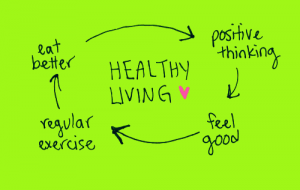“Why? Who said that?” Your voice went shaky, soft, halting, disbelieving. Well, it is not I who said that. It’s our body talking.
I took a careful thought about writing this in order to remind us instead of taking this as a threat.
In 2 years of living a life as a cancer survivor, I had met several cancer survivors, both online and offline; and most of the causes of their cancer are unknown. The only known cause is – STRESS.
Not only cancer survivors. Other people who suffer from chronic diseases are mostly caused by anxiety and stress.
Now, our worry becomes worse. We need help. Friends and loved ones are willing to help but we tend to get mad when someone offers help. Then, we opt to go to the doctor.
Right decision made? Nope!
Take this from the neuroscientists. The Prozac that the doctor will give to us does the same thing if we are grateful (instead of worrying in long-term). Both of them boost the neurotransmitter serotonin.
Another one, the antidepressant Wellbutrin boosts the neurotransmitter dopamine. So does gratitude.
The choice is ours.
Do we want to be happy? Which alternative are we going to choose – the synthetic one (drugs) or the natural one (being grateful)?
See, both of these ways are not as easy to start with as what we think if we choose from one of them. But, when gratitude is being practiced, it becomes a habit. A habit of being grateful that guarantees us not to worry in a long-term basis. A habit that stays for a period of time unlike what drugs can do. It can even destroy us instead of helping us.
Worry is not that really bad when it only stays for an hour or a day. According to neuroscience, worrying can help calm the limbic system (a complex system of nerves and networks in the brain that controls the basic emotion such as fear, pleasure, or anger; and drives as well like hunger, sex, dominance, or care of offspring) by increasing activity in the medial prefrontal cortex (claimed as the mediator in making decisions) and decreasing activity in the amygdala (involved with the experiencing of emotions found inside each cerebral hemisphere of our brain).
That could be sound opposing to common sense expectation, but it serves as an evidence that when we feel anxious, worrying is even better than doing nothing.
But too much anxiety, worrying or guilt leads to an extreme level of stress that sometimes it is already difficult to cope with. If the drugs that the doctor will recommend is precisely equal to being grateful, why can we ask ourselves,
WHAT AM I GRATEFUL FOR?
Being grateful does not only happens on Thanksgiving. There are many reasons we should practice gratitude. Pay attention to the little things happen every day, even the troubles that happen unexpectedly – appreciate both of them. Gratitude doesn’t only make our brain happy, it can also create a positive outcome in our relationships. Like a feedback loop, where happiness feeds happiness. Our troubles, at the same time, develop strength of character where we have the ability to face life unafraid. But just being willing to face our troubles is not enough. We also need to learn how to manage them. Or else, trouble will manage us and will wreck our happiness.
If worrying too much will cause our death, what some people do when worry and stress are encountered?
- Drink excessive alcohol, take drugs or both.
- Eat too much and watch movies at the same time.
- Play video or online games.
- Travel, take a vacation or go on a holiday.
- Party all night.
- Have sex or lots of it.
Do these things help? No, some of them will destroy us and yeah some of them do, but they only last for a day or 2. It doesn’t last. Then we tend to worry again as soon as reality backs it will greet us again the next day. Distracting ourselves from our life doesn’t work – and yet, many of us are guilty of this.
For that reason, we should not worry about things we have no control over, things we have to accept instead. Problems don’t disappear out of themselves. It depends on how we learn skills in order to overcome our distinguished dilemma. John Maxwell gives us two options for how to approach life. If you’re proactive, you focus on preparing. If you’re reactive you end up focusing on repairing.
What you focus on, expands.
Photo courtesy of Cherry Laithang on Unsplash.

My name is Cielo, the author of “The Cancer Voice Asia”, a blog that aims to support and inspire anyone who is facing cancer. I know how it feels to be diagnosed with a rare and aggressive type of cancer, Leiomyosarcoma, at the age of 29. I know the challenges, the fears, the hopes, and the joys of living with cancer. I want to share my story with you and connect you with others who understand what you are going through. Together, we can empower ourselves and fight against the disease. Join me on this platform and let’s make our healing journey a meaningful one.





